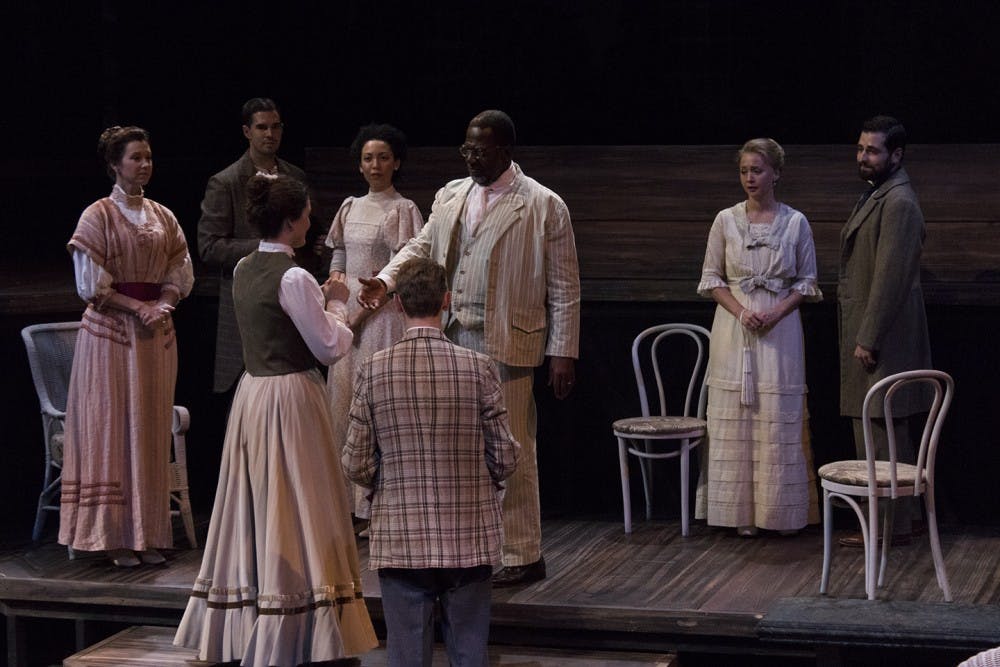Russian playwright Anton Chekhov's work is coming to Longstreet Theatre this month, but not in typical fashion.
Chekhov is widely recognized for works such as "The Seagull," "Three Sisters" and "The Cherry Orchard," all of which are on heavy rotation within the theater community. Not so popular, however, is his earliest work: "Platonov."
"Platonov" centers around the titular Mikhail Platonov, whose stay at a friend’s country house leads to a series of new love interests that threaten his marriage — and his sanity.
Written by Chekhov at the young age of 20, "Platonov" was not published until nearly two decades after his death. As such, the show did not receive the attention of his other works, but it has managed to catch the eye of Steven Pearson, who is directing the USC Department of Theatre and Dance performance.
“A number of years ago I became really intrigued by "Platonov,”' said Pearson in a press release. “I could see connections between some of the characters in this first script and those that appear in his other plays, most particularly "The Cherry Orchard," which was his last play. There’s a kind of youthful energy, and wrestling with the political and social stresses that were happening then. I thought it would be fantastic to edit it using some awareness of his later work.”
Edit he did, working to condense a roughly five and a half hour play to a more manageable hour and 45 minutes.
Pearson said, “Anybody who wants to do it – and there have been a number of interesting takes – has to edit it, while staying true to his voice and the characters and scenes that he’s written.”
The abridged play, which will be performed Nov. 11 through Nov. 17, arrives at an opportune time, as it includes scenes with a notable connection to the holiday season.
“It’s coming up near Thanksgiving, and we have a scene around a table, as you do as Chekhov, and they’re arguing, and debating, and everything else, and it’s very ‘welcome to Thanksgiving at your house with your in-laws,’” said first-year MFA student Jennifer Sanchez.
Sanchez plays Anna Petrovna, who sets the story into motion when she welcomes her friends to her home. Sanchez described her character as having “ulterior motives,” ultimately hoping to seduce Platonov.
First-year MFA student Can Yasar portrays Platonov, whom he describes as an artist and intellectual who “has a conscience for social issues and political issues.” Platanov has traded his personal aspirations in favor of marriage and fatherhood, settling for a more orderly lifestyle than he once envisioned for himself — a lifestyle that does not fulfill him.
“So what happens is that he’s like this caged person who doesn’t know what to do, or how to escape from that, although he wants to escape,” Yasar said.
Arrival at Petrovna’s, of course, finds Platonov surrounded by individuals with whom he can once again explore his intellect, an intellect that captivates and charms the women around him. Thus, he finds himself pulled in several different directions, leading to great inner turmoil and the pursuit of alcohol.
“He is trying to figure out how to escape, how to escape, how to escape, but then every attempt is just taking him more down into the mud,” Yasar said.
Yasar clarifies that, although it may have dark undertones, he feels the show is “not really 100 percent tragedy” and that “it’s going to make people laugh.”
Indeed, a lighter atmosphere is palpable during various scenes of the play in which the characters are gathered together and erupt into a laughter that has a sort of ripple effect, finding its way into the audience as well.
With such humor incorporated throughout, "Platonov" does not fit into the negative, stuffy stereotype often associated with older plays.
“When people hear Chekhov, they always think ... it’s very serious,” Yasar said. “People are afraid of Chekhov. They’re like, ‘oh, it’s going to be sort of a tragedy, it’s going to be long, it’s going to be this language we don’t even understand, or this culture, or whatever, but I think it’s very relatable to real life, to us, to right now.”
Sanchez echoed such sentiments, saying of the audience, “I hope they get to see themselves in it, I hope that they enjoy it, I hope they find parts of it are pretty funny, and the message that love can move mountains, and love is the one thing that all ties us together."
"Platonov" definitely has a variety to offer to its audience.
“People should come see Platonov because it’s beautiful clothes, great acting, a good story,” said Sanchez. “And you get to hear and watch people drink vodka and get plastered.”

